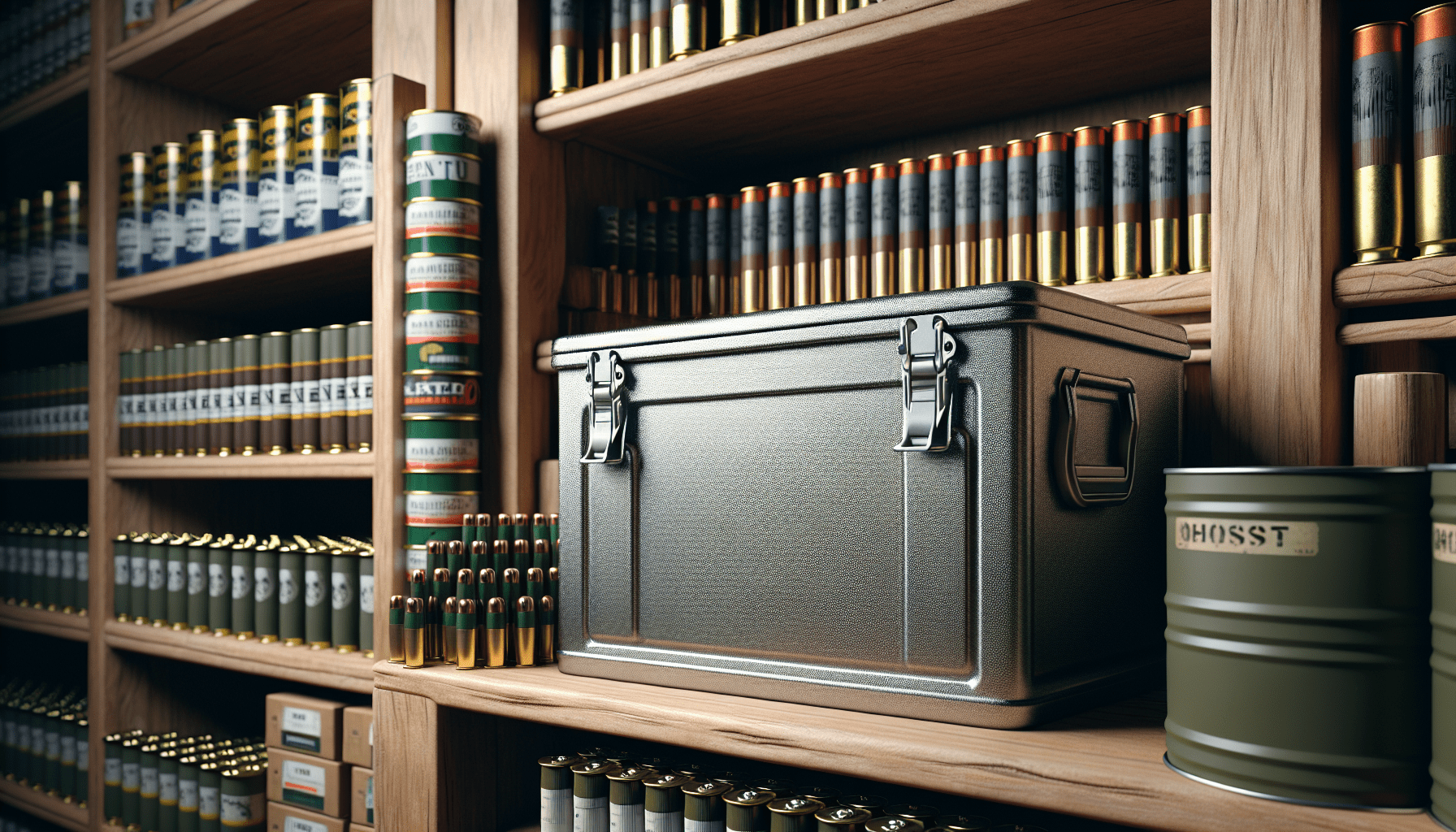Welcome to “How To Safely Store Ammunition,” your go-to guide for ensuring the security and longevity of your ammo. As a responsible gun owner, you understand the importance of proper storage to keep ammunition in prime condition and ensure safety in your home. Green Line Arms in Pensacola, Florida, is not just a gun shop but a community resource dedicated to promoting responsible gun ownership. Here, you’ll find the best tips on safe storage practices, alongside a spectacular selection of firearms, accessories, and training programs. Swing by Green Line Arms for all your firearms needs and first responder medical advice, and rest easy knowing you’re prepared and protected.
Have you ever wondered about the best ways to safely store your ammunition? Whether you’re a seasoned gun owner or new to the world of firearms, knowing how to store your ammunition is crucial for safety, longevity, and performance. Welcome to an informative guide that will walk you through everything you need to know about safely storing ammunition. Let’s dive in!
Why Safe Ammunition Storage is Crucial
Safety is always the number one priority when it comes to firearms. Properly storing your ammunition is essential to ensure that it functions correctly when you need it and to avoid dangerous accidents. Incorrect storage can lead to degraded ammunition, which can cause misfires and other potentially life-threatening malfunctions.
Factors to Consider when Storing Ammunition
Several factors need to be taken into account to ensure that your ammunition is stored safely and effectively. These include humidity, temperature, storage containers, and security.
Humidity Control
Humidity is one of the primary enemies of stored ammunition. Excess moisture can cause corrosion, which can lead to misfires or failures to fire. Here are some suggestions to control humidity levels:
- Silica Gel Packs: These tiny packets can absorb a considerable amount of moisture.
- Dehumidifiers: Keeping a dehumidifier in your ammunition storage area can vastly improve the longevity of your ammo.
Temperature Control
Extreme temperatures, both hot and cold, can also affect ammunition. Here’s what you should aim for:
- Stable Temperatures: Store your ammunition in a location where the temperature remains relatively stable. Fluctuating temperatures can cause condensation, leading to moisture problems.
- Avoid Extreme Heat: High temperatures can cause the propellant in ammunition to degrade over time.
Appropriate Storage Containers
Choosing the right storage container is key to safe ammunition storage. Here are some options and tips:
| Type of Container | Pros | Cons |
|---|---|---|
| Metal Ammo Cans | Durable and often have a watertight seal | Can be heavy and prone to rust |
| Plastic Containers | Lightweight and resistant to rust | May not always be airtight |
| Wooden Crates | Good for larger quantities, aesthetically pleasing | Prone to moisture and can deteriorate |
Security Measures
Ensuring that your ammunition is stored securely is just as essential. Preventing unauthorized access is crucial for safety.
- Locked Cabinets: Investing in a lockable cabinet or safe is highly recommended.
- Out of Reach: Store ammunition out of the reach of children and those who are unauthorized to handle firearms.

Steps for Safe Ammunition Storage
Now that you know the key factors to consider, let’s walk you through the steps for safely storing your ammunition.
Step 1: Select a Suitable Location
The first step in safely storing your ammunition is choosing the right location. Ideally, you want a place that is cool, dry, and secure.
- Basements or Closets: These areas often maintain a stable temperature and can easily be secured with locks.
- Avoid Attics: Attics can often get too hot during the summer months, which isn’t ideal for ammunition.
Step 2: Use the Right Containers
Once you’ve chosen the location, the next step is selecting the appropriate storage containers.
- Labeling: Always label your containers with the type and caliber of the ammunition stored inside.
- Stacking: If you’re using multiple containers, ensure they are not stacked in a manner that could cause the lower containers to be damaged.
Step 3: Implement Humidity Control
As discussed, controlling moisture is essential for the longevity of your ammunition.
- Silica Gel Packs: Place a couple of silica gel packs inside each container.
- Regular Check: Keep an eye on the indicators in your dehumidifier (if using one) and replace or refill as needed.
Step 4: Secure Your Storage Area
The last step is ensuring that your storage area is secure.
- Locks: Install quality locks on your cabinets or safes.
- Accessibility: Ensure that only authorized individuals have access to the storage area.
How to Store Different Types of Ammunition
Different types of ammunition might require different storage considerations.
Handgun Ammunition
Handgun ammunition is relatively easy to store but requires careful consideration regarding the placement and labeling of boxes to avoid any mix-ups.
Rifle Ammunition
Rifle ammo is usually longer and can sometimes come in heavier containers. Make sure that the containers are sturdy and can handle the weight.
Shotgun Shells
Shotgun shells are particularly sensitive to moisture because of their cardboard components. Therefore, focusing on humidity control is even more critical for them.
Specialty Ammo
For specialty ammunition such as hollow points, armor-piercing rounds, or tracers, always follow the manufacturer’s specific storage recommendations.

Green Line Arms: Your Partner in Safe Ammunition Storage
At Green Line Arms, we are committed to promoting responsible gun ownership and providing top-notch services and products, including safe storage options for your ammunition. If you’re ever in Pensacola, Florida, stop by our shop at 1350 South Blue Angel Pkwy. We offer a variety of storage solutions, accessories, and expert advice to help you achieve the safest storage setup.
- Website: Green Line Arms
- Phone: 850-285-0468
Accessories and Maintenance
When it comes to safe ammunition storage, don’t forget about the importance of organizing your firearm accessories. Invest in quality cleaning kits, lubricants, and secure storage options for all your shooting accessories.
Additional Tips for Safe Ammunition Storage
Properly storing ammunition goes beyond just picking the right container and location. Here are some additional tips to ensure maximum safety:
Regular Inspections
Make it a habit to regularly inspect your stored ammunition. Look for any signs of corrosion or damage and take action immediately.
Rotating Stock
To ensure the oldest ammunition gets used first, practice rotating your stock. Mark the purchase date on your boxes and containers, and use the oldest stock first.
Educate Your Family
If you have family members around, especially children, educate them on the importance of not handling ammunition and firearms without supervision.
What To Do with Damaged or Expired Ammunition
If you come across ammunition that has deteriorated or appears damaged, here’s what you should do:
Do Not Use
Never attempt to use damaged or corroded ammunition. Disposing of it is a safer option.
Disposal Recommendations
Many gun ranges and police stations have disposal options for expired or damaged ammunition. Always follow local regulations for safe disposal.
Safe Storage During Transport
If you need to transport your ammunition, here’s how to do it safely:
- Use Original Packaging: Whenever possible, transport ammunition in its original packaging.
- Separate from Firearms: Keep ammunition separate from firearms to avoid any chance of accidental discharge.
- Secure Storage in Vehicle: Ensure that ammo boxes are securely placed in your vehicle.
Traveling Long Distances
If you’re traveling long distances, especially across state lines, ensure you comply with all applicable regulations and laws regarding the transport of ammunition.
Myths About Ammunition Storage
There are plenty of myths surrounding ammunition storage. Let’s debunk a few:
Myth 1: Ammunition Can Last Forever
While modern ammunition can last a long time if stored properly, it’s not indefinite. Even the best-stored ammo can degrade over a long period.
Myth 2: The Refrigerator is a Good Storage Place
Storing ammunition in a refrigerator can cause more harm than good due to temperature fluctuations and moisture.
Myth 3: Sealed Plastic Bags are Perfect
While sealed plastic bags can help with moisture control, they can also trap any existing humidity inside, creating a potential corrosion risk.
Legal Considerations
Make sure you’re aware of any local, state, and federal regulations concerning ammunition storage. Different jurisdictions have different requirements, and staying compliant is crucial.
State and Local Laws
Some states may have specific laws about how ammunition should be stored, especially if you have large quantities.
Federal Standards
While federal laws are often less restrictive, they provide general guidelines on safe storage practices, particularly for those who own firearms for business purposes.
Final Thoughts
Storing your ammunition safely is an essential part of responsible gun ownership. Following the guidelines outlined in this article will not only ensure the longevity and performance of your ammunition but also keep you and those around you safe. Remember, Green Line Arms is here to support you with all your firearms, ammunition, and accessory needs. Feel free to reach out to us for more expert advice and resources.
For more tips on firearms safety and first responder medical tips, visit Green Line Arms in person or check out our website. We’re here to help you build a safer, well-prepared community.
Remember, pray for peace, but always prepare for war.
Feel free to leave any questions or comments below. Stay safe!




